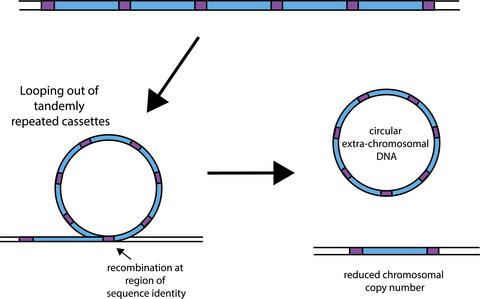当前位置:
X-MOL 学术
›
Mol. Microbiol.
›
论文详情
Our official English website, www.x-mol.net, welcomes your feedback! (Note: you will need to create a separate account there.)
The contribution of extrachromosomal DNA to genome plasticity in malaria parasites
Molecular Microbiology ( IF 3.6 ) Pub Date : 2020-10-26 , DOI: 10.1111/mmi.14632 Xu Zhang 1 , Kirk W Deitsch 1 , Laura A Kirkman 1, 2
Molecular Microbiology ( IF 3.6 ) Pub Date : 2020-10-26 , DOI: 10.1111/mmi.14632 Xu Zhang 1 , Kirk W Deitsch 1 , Laura A Kirkman 1, 2
Affiliation

|
Malaria caused by the protozoan parasite Plasmodium falciparum continues to impose significant morbidity and mortality, despite substantial investment into drug and vaccine development and deployment. Underlying the resilience of this parasite is its remarkable ability to undergo genome modifications, thus, providing parasite populations with extensive genetic variability that accelerates selection of drug resistance and limits the efficacy of most vaccines. This genome plasticity is rooted in the mechanisms of DNA repair that parasites employ to maintain genome integrity, a process skewed toward homologous recombination through the evolutionary loss of classical nonhomologous end joining. Repair of DNA double‐strand breaks have been shown to enable “shuffling” of antigen‐encoding gene sequences to vastly increase antigen diversity and to enable copy number expansion of genes that contribute to drug resistance. The latter phenomenon has been proposed to be a major contributor to the rise of resistance to several classes of antimalarial drugs. In this issue of Molecular Microbiology, McDaniels and colleagues add yet another mechanism that malaria parasites use to reduce drug susceptibility by demonstrating that P. falciparum can maintain expanded arrays of drug resistance cassettes as stably replicating, circular, extrachromosomal DNAs, thus, expanding genome plasticity beyond the parasite’s 14 nuclear chromosomes.
中文翻译:

染色体外 DNA 对疟原虫基因组可塑性的贡献
由原生动物寄生虫恶性疟原虫引起的疟疾尽管对药物和疫苗的开发和部署进行了大量投资,但仍会导致严重的发病率和死亡率。这种寄生虫的复原力的基础是其非凡的基因组修饰能力,因此,为寄生虫种群提供了广泛的遗传变异性,加速了耐药性的选择并限制了大多数疫苗的功效。这种基因组可塑性植根于寄生虫用来维持基因组完整性的 DNA 修复机制,这一过程通过经典的非同源末端连接的进化丧失而倾向于同源重组。DNA双链断裂的修复已被证明能够“改组”抗原编码基因序列,从而极大地增加抗原多样性,并能够扩大导致耐药性的基因的拷贝数。后一种现象被认为是对几类抗疟药耐药性增加的主要原因。在本期分子微生物学,McDaniels 及其同事通过证明恶性疟原虫可以维持扩展的耐药盒阵列作为稳定复制的环状染色体外 DNA,从而增加了疟疾寄生虫用于降低药物敏感性的另一种机制,从而将基因组可塑性扩展到寄生虫之外 14核染色体。
更新日期:2020-10-26
中文翻译:

染色体外 DNA 对疟原虫基因组可塑性的贡献
由原生动物寄生虫恶性疟原虫引起的疟疾尽管对药物和疫苗的开发和部署进行了大量投资,但仍会导致严重的发病率和死亡率。这种寄生虫的复原力的基础是其非凡的基因组修饰能力,因此,为寄生虫种群提供了广泛的遗传变异性,加速了耐药性的选择并限制了大多数疫苗的功效。这种基因组可塑性植根于寄生虫用来维持基因组完整性的 DNA 修复机制,这一过程通过经典的非同源末端连接的进化丧失而倾向于同源重组。DNA双链断裂的修复已被证明能够“改组”抗原编码基因序列,从而极大地增加抗原多样性,并能够扩大导致耐药性的基因的拷贝数。后一种现象被认为是对几类抗疟药耐药性增加的主要原因。在本期分子微生物学,McDaniels 及其同事通过证明恶性疟原虫可以维持扩展的耐药盒阵列作为稳定复制的环状染色体外 DNA,从而增加了疟疾寄生虫用于降低药物敏感性的另一种机制,从而将基因组可塑性扩展到寄生虫之外 14核染色体。



























 京公网安备 11010802027423号
京公网安备 11010802027423号